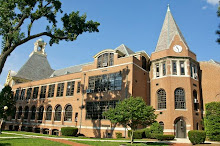The following op-ed piece appeared in today's Bergen Record. (And yes I did notice that on the website, they spelled 'academics' wrong. Ha!)
What caught my eye was the statement that schools are not simply for job-training. I've said that for years. I believe it applies to college, too, but definitely high school.
With that said, however, while I do generally applaud the desire to educate our kids better, I have serious administrative concerns about some of these mandates which are so blithely handed down by Commissioner Davy. One example: She wants every single child to have some sort of individual academic plan created and, I assume, maintained and updated. Lovely idea. But realize it will take some sort of administration to make that happen...and this in the face of pressure to reduce administrative costs.
Anyway, just wanted to share the below teacher's opinion with you...and ask what you think?
Tougher academcis (sic) will develop better citizens
The purpose of education is not simply to gain employment.
LAST WEEK state Commissioner of Education Lucille Davy outlined a bold new plan for our secondary schools. It would require all New Jersey students to successfully complete a broader and deeper range of subjects in the areas |of science, language (both English and foreign) |and math.
Such an expansion is welcome, although I expect our students may feel differently.
Essentially her plan would give all our students the equivalent of a liberal arts education at the secondary school level. It means that our students will need to work harder to succeed in this enhanced curriculum, but there has never been anything wrong with requiring students to work harder.
Many will view some of these new requirements as impositions; students between the ages of 12 and 18 are not likely to see the value of these courses, although Davy clearly does.
What used to be acceptable requirements for graduation are no longer adequate, and Davy's initiative goes a long way toward rectifying that deficiency. Few would understand the controversy over stem cell research without having taken a course in biology. Similarly the opening of the new Large Hadron Collider in Europe has little significance to anyone lacking even a rudimentary course in chemistry or physics. In short many of the developments we read about cannot be understood without the basic knowledge that these newly required courses will provide.
Too many students have the idea that school's sole purpose is to provide an education that will enable them |to gain employment. I do not minimize that goal. But education should also serve the purpose of providing the tools to make intelligible the science articles in newspapers, those simple communications of basic information that we come across each day.
Such articles are clearly not interesting to everyone. But the ability to read and understand them is essential. There can be no intelligent public debate about stem cell research, for example, if the general population lacks a basic understanding of biology. Without a similar understanding of chemistry the news that North Korea or Iran has acquired more high-speed centrifuges has little significance.
Math is the underpinning of science, and as such mandating Algebra I and II is appropriate. Such courses provide a framework for problem-solving within the sciences. In the absence of mastering basic algebra skills, students find science courses substantially more problematic.
I was disappointed that geometry was not part of Davy's expanded curriculum as that course develops a skill that has applications everywhere: logic. Over the past two decades fewer and fewer students have been exposed to this course, and their education is diminished by its absence.
Nonetheless, I am happy to read of New Jersey's effort to offer a public education that will produce more well-rounded citizens.
Roy Landis, a math teacher, lives in Cresskill.
Welcome!
Welcome to Laurie Goodman's blog. I use this space to share news and opinions about education and schools in Ridgewood, the state of New Jersey and the nation, in addition to other issues I'm personally interested in. I invite you to share your thoughts, feelings, questions or opinions, too, by posting comments on any blog entry. Please observe basic courtesy -- keep your comments focused on issues, no personal attacks or bullying, please. Contact me directly at: lauriegood@mac.com
Subscribe to:
Post Comments (Atom)






No comments:
Post a Comment